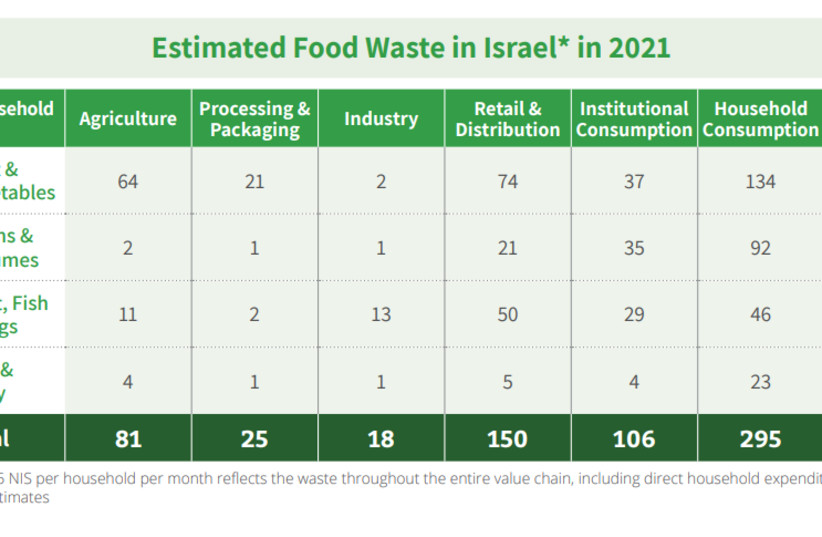The dumpster-bound pastries that a cafe couldn’t sell. An entire platter of salmon that went untouched at a wedding. The banana that you opened for your toddler but she only took one bite and then you threw it away because you were nervous about contracting hand, foot and mouth disease. Food waste is everywhere and it’s perpetrated by nearly everyone, save for the world’s most diligent grandmothers.
Some countries recognize the issue of food waste happening within their borders, implementing solutions and programs to mitigate it. Unfortunately, Israel is not one of them.
Over the past five years, these numbers have only grown. According to Leket Israel’s Food Waste and Rescue Report, some 37% of the nation’s food production last year ended up in the trash, totaling 2.6 million tons of wasted food worth about NIS 21.3 billion. Half of that food is salvageable and fit for human consumption.
Israel's food waste policies are the worst in the OECD
The report, which examines the governmental steps in OECD countries to implement policy tools to reduce food waste, concluded that compared to other nations, Israel is the worst in enacting food waste solutions, having implemented the fewest number of policy tools to eradicate this phenomenon out of 18 other developed countries.

“This report is published at a time when world leaders gather in Sharm e-Sheikh, Egypt, to discuss solutions to solve the climate crisis and related global issues, such as the food waste crisis,” said Environmental Protection Minister Tamar Zandberg.
“Food rescue and minimizing food waste are necessary actions that need to be taken to preserve Israel's environmental, social and economic resilience. It is critical that the State of Israel bridge gaps to align with other OECD countries addressing the issue of food waste and rescue. And through a ministry-wide and sweeping government move, we will be able to meet the challenge.”
Tamar Zandberg
“Food rescue and minimizing food waste are necessary actions that need to be taken to preserve Israel’s environmental, social and economic resilience,” she said. “It is critical that the State of Israel bridge gaps to align with other OECD countries addressing the issue of food waste and rescue. And through a ministry-wide and sweeping government move, we will be able to meet the challenge.”
Food rescue policy tools could make a serious impact on national food security, a pressing issue that affects 16.2% of households throughout the country, according to BDO Consulting Israel, which wrote Leket’s report. This is the result of Israel’s 19.8% poverty rate – which also ranks at #1 among OECD countries.
“Israel ranking lowest among countries with food rescue policies requires the new government, as part of the fight against the rising cost of living, to adopt a comprehensive food rescue policy,” said Chen Herzog, chief economist at BDO and editor of the report.
HERZOG NOTED that food waste has played a major role in raising Israel’s cost of living, exacerbated by the war in Ukraine, which has increased food prices even more as import supply from the nearby nation has faltered. Food rescue can solve this, he believes.
“Food rescue is an economic and socially advantageous solution to combating food waste. Every NIS 1 invested in food rescue contributes NIS 4.3 to the national economy,” Herzog said.
The report recommends several policies which could mitigate the country’s substantial losses. Besides the development of a national food waste plan, the report suggests other policies including a national goal to cut food waste in half by 2030, the reevaluation of expiration dates, mandatory food donations, and the possibility of banning the transportation of organic waste to landfills.
“At a time when not just 20% of the country’s population is in need of assistance, but the entire world is facing a climate crisis, wars and pandemics that are undermining everything we knew about food reserves and food security, the time has come for a complete overhaul of priorities in Israel, coming directly from the Prime Minister’s Office with food rescue at the top of the list,” stated Leket CEO Gidi Kroch.
“The greatest advantage of food rescue is the ability to not only close the entire food insecurity gap in Israel by a quarter of the budget, but also greater utilization of natural resources and waste prevention. Additionally, food rescue helps reduce gas emissions and pollutants and strengthens the fight against the global climate crisis,” he said.
“It is incomprehensible that there is a solution that exists that would be effective across the board with economic, social, environmental and health benefits, and yet, the government ignores it with its indifference,” Kroch said.
“We no longer have that privilege. The entire world is under a real threat, he said. “The time to act is now, we need to take effective steps to reduce food waste and to preserve existing resources. Israel must come out of its indifference and immediately join the fight to reduce this crisis.”
